Solar System
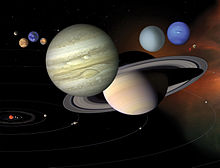
The Solar System comprises the Sun and the objects that orbit it, whether they orbit it directly or by orbiting other objects that orbit it directly. Of those objects that orbit the Sun directly, the largest eight are the planets that form theplanetary system around it, while the remainder are significantly smaller objects, such as dwarf planets and small Solar System bodies (SSSBs) such as comets and asteroids. The Solar System formed 4.6 billion years ago from the gravitational collapse of a giant molecular cloud. The vast majority of the system's mass is in the Sun, with most of the remaining mass contained in Jupiter. The four smaller inner planets, Mercury, Venus, Earth and Mars, also called the terrestrial planets, are primarily composed of rock and metal. The four outer planets, called the gas giants, are substantially more massive than the terrestrials. The two largest, Jupiter and Saturn, are composed mainly of hydrogen and helium; the two outermost planets, Uranus and Neptune, are composed largely of substances with relatively high melting points (compared with hydrogen and helium), called ices, such as water, ammonia and methane, and are often referred to separately as "ice giants". All planets have almost circular orbits that lie within a nearly flat disc called the ecliptic plane.
Quotes
[edit]- Quotes are arranged alphabetically by author
A–F
[edit]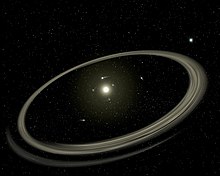

- You are the descendant of a tiny cell of primordial protoplasm washed up on an empty beach three and a half billion years ago. You are the blind and arbitrary product of time, chance, and natural forces. You are a mere grab-bag of atomic particles, a conglomeration of genetic substance. You exist on a tiny planet in a minute solar system in an empty corner of a universe. You are a purely biological entity, different only in degree but not in kind from a microbe, virus, or amoeba. You have no essence beyond your body, and at death you will cease to exist entirely. In short you come from nothing and are going to nowhere.
- Randy Alcorn in the “Two Sources of Self-Esteem” quoted in: Ron Carlson, Ed Decker Fast Facts® on False Teachings, Harvest House Publishers, 1 July 2003, p. 49.
- It is the sun-fluids or emanations that impart all motion, and awaken all into life, in the Solar System. It is attraction and repulsion, but not as understood by modern Physics or according to the law of gravity, but in harmony with the laws of manvantaric motion designed from the early Sandhyâ, the Dawn of the rebuilding and higher reformation of the System.
- H.P. Blavatsky, The Secret Doctrine, Vol. 1, p. 578 (1888)
- I've had experiences in my life that leave no doubt in my mind about the fact that God exists. I'm quite willing to debate people who don't think so because I want them to explain to me how did our solar system get so organized and how is the universe so complex and yet well-organized that we can predict 70 years hence when a comet is coming?
- Benjamin Carson in: Controversial address vaults Hopkins' Carson into political arena, The Baltimore Sun, 18 February 2013.
- Not that chance dominated events in the early Solar System, for scientific determinism was also functioning. But chance is an essential factor in all evolutionary events, and the birth and development of our planetary system were not exceptions.
- Eric Chaisson in: Epic of Evolution: Seven Ages of the Cosmos, Columbia University Press, 13 August 2013, p. 126.
- When you look at the stars and the galaxy, you feel that you are not just from any particular piece of land, but from the solar system.
- Kalpana Chawla in: Dream Catcher Paul Fisette What? Is! the Meaning of Life, Lulu.com, 26 November 2008, p. 79

- I've been saying for a long time that I'm hoping to find intelligent life in Washington. I'm reasonably sure there must be life in this solar system, on Mars or on Europa, and other places. I think life is probably going to be ubiquitous, though we still don’t have proof of that yet, and still less of intelligent life anywhere. But I hope that will be coming in the next decade or so through radio astronomy or, perhaps, the discovery of objects in space, which are obviously artificial. Astronomical engineering – that may the other thing to look for.
- Sir Arthur C. Clarke in: Neil McAleer Sir Arthur C. Clarke: Odyssey of a Visionary: A Biography, RosettaBooks, 1 April 2013, p. 322.
- The word "planet" originally described "wanderers" that were known only as moving lights in the sky. Recent discoveries lead us to create a new definition, which we can make using currently available scientific information...our Solar System is defined into three distinct categories in the following way:
(1) A planet is a celestial body that (a) is in orbit around the Sun, (b) has sufficient mass for its self-gravity to overcome rigid body forces so that it assumes a hydrostatic equilibrium (nearly round) shape, and (c) has cleared the neighbourhood around its orbit.
(2) A "dwarf planet" is a celestial body that (a) is in orbit around the Sun, (b) has sufficient mass for its self-gravity to overcome rigid body forces so that it assumes a hydrostatic equilibrium (nearly round) shape,(c) has not cleared the neighbourhood around its orbit, and (d) is not a satellite.
(3) All other objects, except satellites, orbiting the Sun shall be referred to collectively as "Small Solar System Bodies".
Pluto is a "dwarf planet" by the above definition and is recognized as the prototype of a new category of Trans-Neptunian Objects.- Definition by International Astronomical Union (IAU) in: Resolution B5 Definition of a Planet in the Solar System, International Astronomical Union (iau.org).
- The Solar System consists of eight "planets" Mercury, Venus, Earth, Mars, Jupiter, Saturn, Uranus and Neptune. A new distinct class of objects called "dwarf planets" exist. "Planets" and "dwarf planets" are two distinct classes of objects. The first members of the "dwarf planet" category are Ceres, Pluto and 2003 UB313 (temporary name).
- Definition by International Astronomical Union (IAU) in: iau0603 — News Release, International Astronomical Union, 2006

- His genius in promoting an evolution doctrine as regards the mechanical formation of the solar system was great, and his mode of thought strengthened the current of evolutionary doctrine generally; but his constant dread of persecution, both from Catholics and Protestants, let him steadily to veil his thoughts and even suppress them.
- René Descartes in: Andrew Dickson White A History of the Warfare of Science with Theology in Christendom, Prometheus Books, p. 57.
- The great object of all knowledge is to enlarge and purify the soul, to fill the mind with noble contemplations, to furnish a refined pleasure, and to lead our feeble reason from the works of nature up to its great Author and Sustainer. Considering this as the ultimate end of science, no branch of it can surely claim precedence of Astronomy. No other science furnishes such a palpable embodiment of the abstractions which lie at the foundation of our intellectual system; the great ideas of time, and space, and extension, and magnitude, and number, and motion, and power. How grand the conception of the ages on ages required for several of the secular equations of the solar system; of distances from which the light a [[w:Fixed stars|fixed star would not reach us in twenty millions of years, of magnitudes compared with which the earth is but a foot-ball; of starry hosts—suns like our own—numberless as the sands on the shore; of worlds and systems shooting through the infinite spaces.
- Edward Everett in: "The Uses of Astronomy:An Oration, Ross & Tousey, 28 July 1856.
G–L
[edit]
- There seems to be no end to the senseless wickedness done on this little planet in a minor solar system, and we puny mortals appear to be decreasing in importance so far as the universe is concerned.
- Alec Guinness in: My Name Escapes Me: The Diary of a Retiring Actor, Penguin Group (USA) Incorporated, 1 December 1998, p. 57.
- The world, when you look at it, it just can't be random. I mean, it's so different than the vast emptiness that is everything else, and even all the other planets we've seen, at least in our solar system, none of them even remotely resemble the precious life-giving nature of our own planet.
- Chris Hadfield in: Dominique Mosbergen Astronaut Chris Hadfield Learned A Lot About Spirituality In Space, The Huffington Post , 11 July 2013.
- You were a fruit-tree after all. Imagine, then, that a billion years ago some beings from another part of the galaxy made a tour through the solar system in their flying saucer and found no life. They would dismiss it as "Just a bunch of old rocks".
- Douglas E. Harding in: Robert Disch The ecological conscience; values for survival, Prentice-Hall, 1970, p. 188.
- If you look at the history of big obstacles in understanding our world, there's usually an intuitive assumption underlying them that's wrong. In the case of the Solar System it was intuitively obvious that the Earth was at the center of the Solar System and things moved around us, but that just turned out to be wrong. … And it intuitively seems correct that the brain is just some sort of computer—it just seems natural. … But it has undermined almost all of our work to build intelligent machines and understand thinking. It's just wrong … the brain isn't like a computer at all.
- Damn the Solar System. Bad light; planets too distant; pestered with comets; feeble contrivance; could make a better one myself.
- Lord Francis Jeffrey in: Alessandra Celletti, Ettore Perozzi Celestial Mechanics: The Waltz of the Planets, Springer Science & Business Media, 24 June 2007, p. 86.
- So far as thought may peer into the past, the epic of our solar system began with a great catastrophe. Two suns met. What had been, ceased; what was to be, arose. Fatal to both progenitors, the event dated a stupendous cosmic birth.
- Percival Lowell in “Mars as the Abode of Life (1908)” quoted in:The Quarterly Journal - University of North Dakota, Volume 7, University of North Dakota., 1917, p. 47.
M–R
[edit]
- Newton supposed that all matter attracted other matter inversely according to the square of the distance; and the hypothesis was found to account for the whole movements of the heavenly bodies; which all became verifications of what Newton supposed to be the law of the solar system. Adopt the hypothesis that Jesus was what He is represented, and the whole of the books and the history becomes a verification.
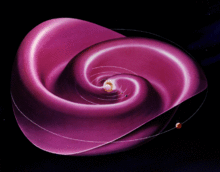
- The Solar System, assemblage consisting of the Sun—an average star in the Milky Way Galaxy—and those bodies orbiting around it: 8 (formerly 9) planets with about 170 known planetary satellites (moons); countless asteroids, some with their own satellites; comets and other icy bodies; and vast reaches of highly tenuous gas and dust known as the interplanetary medium.
- Tobias Chant Owen in: Solar system, 12 August 2014.
- The Sun, Moon, and brightest planets were visible to the naked eyes of ancient astronomers, and their observations and calculations of the movements of these bodies gave rise to the science of astronomy. Today the amount of information on the motions, properties, and compositions of the planets and smaller bodies has grown to immense proportions, and the range of observational instruments has extended far beyond the solar system to other galaxies and the edge of the known universe. Yet the solar system and its immediate outer boundary still represent the limit of our physical reach, and they remain the core of our theoretical understanding of the cosmos as well. Earth-launched space probes and landers have gathered data on planets, moons, asteroids, and other bodies, and this data has been added to the measurements collected with telescopes.
- Tobias Chant Owen in: "Solar system".
- In future, children won't perceive the stars as mere twinkling points of light: they'll learn that each is a 'Sun', orbited by planets fully as interesting as those in our Solar system.
- Martin Rees in: Small, cheap and a giant leap for Britain, The Guardian, The Observer, 27 December 2003.
- Anaximandros... pupil and companion of Thales, was like him an astronomer, geographer, and physicist, seeking for a first principle (for which he invented the name); affirming an infinite material cause, without beginning and indestructible, with an infinite number of worlds;—and still showing the Chaldean impulse—speculating curiously on the descent of man from something aquatic, as well as on the form and motion of the earth (figured by him as a cylinder), the nature and motions of the solar system, and thunder and lightning. It seems doubtful whether, as affirmed by Eudemus, he taught the doctrine of the earth's motion; but that this doctrine was derived from the Babylonian schools of astronomy is so probable that it may have been accepted in Miletos in his day.
- John Mackinnon Robertson in: Short History of Freethought Ancient and Modern, Vol.1, Watts, 1906, p. 141.
- That man is the product of causes which had no prevision of the end they were achieving; that his origin, his growth, his hopes and fears, his loves and beliefs, are but the outcome extension of accidental collocations of atoms; that no fire, no heroism, no intensity of thought or feeling can preserve a life beyond the grave; that all labors of the ages; all the devotion, all the inspiration, all the noon day brightness of human genius, are destined to extinction in the vast death of the solar system; and the whole temple of Man's achievement must inevitably be buried beneath the debris of a universe in ruins—all these things, if not quite beyond dispute, are yet so nearly certain that no philosophy which rejects then can hope to stand. Only within the scaffolding of these results, only on the firm foundation of unyielding despair, can the safe habitation of the soul be safely built.
- Bertrand Russell in: Michio Kaku Hyperspace: A Scientific Odyssey through Parallel Universes, Time Warps, and the Tenth Dimension, Oxford University Press, 5 October 1995, p. 302.
S–Z
[edit]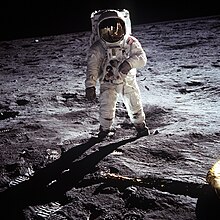
- The suppression of uncomfortable ideas may be common in religion or in politics, but it is not the path to knowledge, and there is no place for the endeavor of science. We do not know beforehand hand where fundamental insights will arise from about our mysterious and lovely solar system, and the history of our study of the solar system shows clearly that accepted and conventional ideas are often wrong, and the fundamental insights can arise from the most unepected sources.
- Carl Sagan in: Isn't Religion Weird? Quotations for Atheists, Lulu.com, 8 August 2008, p. 76.
- The Cosmos extends, for all practical purposes, forever. After a brief sedentary hiatus, we are resuming our ancient nomadic way of life. Our remote descendants, safely arrayed on many worlds throughout the Solar System and beyond, will be unified by their common heritage, by their regard for their home planet, and by the knowledge that, whatever other life may be, the only humans in all the Universe come from Earth. They will gaze up and strain to find the blue dot in their skies. They will love it no less for its obscurity and fragility. They will marvel at how vulnerable the repository of all our potential once was, how perilous our infancy, how humble our beginnings, how many rivers we had to cross before we found our way
- Carl Sagan in: Gregory Schrempp The Faith of Scientists: In Their Own Words, Princeton University Press, 2008, p. 227.
- In more than one respect, the exploring of the Solar System and homesteading other worlds constitutes the beginning, much more than the end, of history.
- Carl Sagan in: Pale Blue Dot: A Vision of the Human Future in Space, Random House Publishing Group, 6 July 2011, p. 344.
- In that case, on behalf of Earth life, I urge that, with full knowledge of our limitations, we vastly increase our knowledge of the Solar System and then begin to settle other worlds.
- Carl Sagan in: “Pale Blue Dot: A Vision of the Human Future in Space”, p. 337.
- Once upon a time, we soared into the Solar System. For a few years. Then we hurried back. Why? What happened? What was 'Apollo' really about?”
- Carl Sagan in: The Planetary Report, Volumes 13-14, Planetary Society, 1993, p. 324.
- The solar system is off center and consequently man is too, which is a rather nice idea because it means that man is not such a big chicken. He is incidental – my favorite term is peripheral.
- Harlow Shapley in: Marcia Bartusiak The Day We Found the Universe, Vintage Books, 2010, p. 131.
- Just as Copernicus in the sixteenth century had removed the Earth from the center of the Solar System, Shapley relocated the Solar System from the heart of the Milky Way.
- Music can be all things to all persons. It is like a great dynamic Sun in the center of a solar system which sends out its rays and inspiration in every direction.... Music makes us feel that the heavens open and a divine voice calls. Something in our souls responds and understands.
- Leopold Stokowski in: Jennifer Leigh Selig Thinking Outside the Church: 110 Ways to Connect with Your Spiritual Nature, Andrews McMeel Publishing, 2004, p. 212.
- From days of long ago, from uncharted regions of the universe, comes a legend. The legend of Voltron: Defender of the Universe. A mighty robot, loved by good, feared by evil. As Voltron's legend grew, peace settled across the galaxy. On Planet Earth, a Galaxy Alliance was formed. Together with the good planets of the Solar System, they maintained peace throughout the universe until a new horrible menace threatened the galaxy. Voltron was needed once more. This is the story of the super force of space explorers. Specially trained and sent by the alliance to bring back, Voltron: Defender of the Universe.
- Lion Voltron (Golion) in: Voltron: Defender of the Universe (1984– ), IMDb.
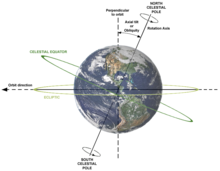
- In the present motions of the bodies which constitute the solar system there are motions in planes inclined to that equatorial plane.... The effort to eliminate the comets from the solar system, so as to avoid the responsibility of accounting for their origin, is a confession of the hypothesis [nebular hypothesis that all planetary motion began in one plane – the plane of the equator of the cosmical [[sphere] But the stability of the solar systems supposed to have been demonstrated by mathematical analysis.
- D.D.Whedon in: Methodist Review, Volume 59, G. Lane & P. B. Sandford, 1877, p. 659.
Anonymous
[edit]- Boston State-House is the hub of the solar system. You couldn't pry that out of a Boston man if you had the tire of all creation straightened out for a crowbar.
- Anonymous in: Peter Gibian Oliver Wendell Holmes and the Culture of Conversation, Cambridge University Press, 16 August 2001, p. 146.

